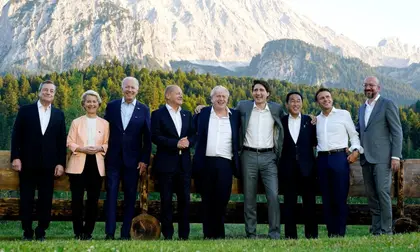At their summit meeting at Schloss Elmau in Bavaria, the heads of state and government of the leading Western industrial powers have demonstrated unity via-à-vis Russia. However, it remains to be seen whether further allies can be won and new ideas implemented beyond the sanctions imposed so far. Europe’s press is at odds over how much clout the G7 still wields.
G7 no longer as strong as it once was
The West has lost economic power and consequently political clout massively since the 1990s, economist Lukáš Kovanda writes on Echo24:
JOIN US ON TELEGRAM
Follow our coverage of the war on the @Kyivpost_official.
“Nothing groundbreaking can be expected from the G7 summit. Any effective sanctions that the West had at its disposal are already in force. They are having a noticeable impact on Russia, but only gradually. What weakens the countries of the West, however, is that they no longer dominate the world economically, as they did in the 1990s. If economies like China, India, Indonesia, Saudi Arabia and others could be brought on board with the sanctions against Russia, they would be infinitely more effective. But that isn’t going to happen.”
A chance to stop Putin
The G7 summit offers an opportunity to forge a greater alliance against Russia, comment political scientists Dina Smeltz and Susi Dennison in La Libre Belgique:
“To honour Ukraine’s fierce struggle and increase the economic pressure of international sanctions, the G7 countries must now step up their military support and tighten sanctions. A strong transatlantic alliance will not be enough to mobilise the international system and hold Russia to account. But it can provide a solid foundation from which to spur on other global partners to join forces and maintain the possibility of peace and justice.”

ISW Russian Offensive Campaign Assessment, January 23, 2025
Finding their place in the new world order
At the very least this alliance could bring some stability to the global chaos, the Tages-Anzeiger writes:
“If the G7 guests – from Argentina to India to Senegal – understand that it is to their advantage to side with regulated free trade and democracies, it would be a victory in this age of new bloc-building. … There will be no return to the globalisation of the noughties and twenty-tens. Russia has left the circle of Western states. China has decided (under Xi Jinping at least, and in any case until the next party congress) to play the dividing game on Putin’s side. So the G7 societies don’t have many options left: they must find their place in the new world order and cushion the blows.”
Push through price cap on Russian oil
Corriere della Sera hopes for clear words on the possibility of a price cap on oil:
“There is still some uncertainty about the US proposal to introduce a price cap on Russian oil, which would have the double effect of limiting Russia’s financing capacities and also cushioning the impact on energy prices in the West. The idea, proposed by Biden and supported by France and Italy, is still meeting with reservations in Germany. … To be effective, the measure would have to be applied by a large number of countries going far beyond the G7 and starting with the 27 countries of the European Union.”
You can also highlight the text and press Ctrl + Enter










